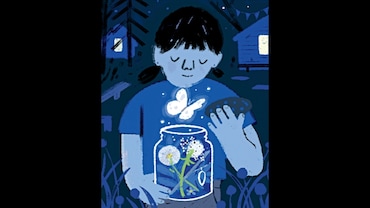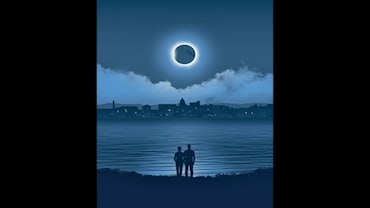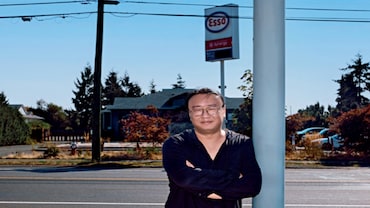- HOME
- /
- True Stories
- /
- My Story
- /
Call Me By My Name
A life hinging on contradictions and duality, the only acceptance he seeks is from his parents.
 Illustration by Ashvini Menon
Illustration by Ashvini Menon
It was an innocent phone call that almost became my undoing. "Why will you be late?" asked my mother. "Because I have to walk the gay Pride parade, Ma." Just like that, it slipped out. She waited a split second before asking, a hint of suspicion entering her voice: "Why?" This was the moment: I could have come out to her. But a part of me nixed that hope. "Because I have to support my friends, Ma. I have to be there for them," I lied. This was in 2009, when I was 25 and still living with my parents.
I've known about my sexuality pretty much all my life. People ask me: at what age did you actually know? I ask back: at what age does a straight person know? I gravitated towards whomever I found naturally attractive, like a child who prefers a certain food to another but doesn't quite know how to articulate it. I finally came out to my friends towards the end of college.
To make my coming out easier, I told everyone I discovered I was gay in a moment of epiphany in my final year of college. I had had a real girlfriend until my second year. The story I put out was that we broke up because of relationship problems. The truth is, I had broken up with her because I could no longer carry on the charade. I did love her, deeply, just not the way she would have wanted me to.
Gradually, after the much-touted-about epiphany, and as college ended, my friends came to accept me for who I was. This was a blessing that would turn out to be a curse later. After graduating, the industry I became part of---let's call it a creative field in which gay men are the norm---truly gave me wings. I slept around like it was going out of style, but always returned home before a certain hour of the night. I never smelt of cigarettes or booze, but even if they caught a whiff, my parents never brought it up. I found stable love: an older man who taught me not only to respect my sexuality, but to never feel bad about who I was. Like all first loves, this one didn't last. But it left me wiser and enriched. It taught me that relationships are relationships, and everyone fights the same battles with insecurity, jealousy, overprotectiveness and ego.
In parallel, my public acceptance was so amazing that I never sought to live up to this ideal of the perfectly straight man. I blossomed into a confident individual who worked hard and partied proportionally, knew all the right people and became known for his work. As I grew within my industry, my circle expanded too. An entire professional circuit, composed mostly of gay men (yes, I'm generalizing, but that's not the point here), knew me as one of them.
I had new fears now: What if any of them have any connection to any part of my family? What if a cousin or an uncle or aunt bumps into someone I know at a party? If you think I was being paranoid---no; I had good reason to be scared.
Once a cousin I'm not really close to called to talk about a new business venture that he and his friend wanted to launch. And since I was a bit of an industry expert, could I look over the proposal and advise? Also, surprise, this friend knew of me! What a coincidence! With trepidation, I went to meet them. Luckily, I was thrown a lifeline when the friend arrived at the coffee shop before my cousin. I requested him to keep my sexuality to himself, and he, a thoroughly decent guy, said he understood and would never out me inadvertently. This was three years ago.
Since I first came out to my friends, I have imagined, dreamt of and even practised having 'the talk' with my parents in make-believe scenarios. My mum and dad are my everything, and they have worked hard to give me the upbringing I had: an English-medium education, a student loan to help me get through my studies and their unending support. So it's important for me to do this right.
They are unaware of queerness at a conceptual level. They may have absorbed some disjointed information on it from the mainstream media, but that's hardly the foundation of an understanding and accepting awareness of the queer world. I am hopeful, if a little scared. But I've never been able to visualize my parents' reaction to this imagined conversation. I'm their only child; so at some level they know their son is, well, 'different' (different from what they know or expect).
I grew up in a simple, middle-class family with no pretensions or money. Early on, it was about academics. I was an above-average student and chose humanities after 10th with the caveat that I would do well (my parents had wanted me to study the sciences, naturally). I topped my class in 11th and 12th. They didn't stop me from enrolling in a vocational training institute for a diploma, not a degree. After graduating, when I said I wanted to become a journalist, they said "you better be good". I worked with the best publications, making it to the launch teams of two international magazines. Now, I'm writing for an iconic magazine that I grew up reading.
So this was my childhood: I was always loved and encouraged, and I strove to do my best. My parents never refused me anything, instead showering me with unconditional support. So you can imagine how blessed I feel---and how worried I am about disappointing them.
Today, I live apart from them in the same city. We see each other often. And though they are not on my Facebook friends list, I try to keep them involved in my life. It's a constant act of balancing the information I give them. They are proud of the home I have set up, that I don't live like a "dirty bachelor with clothes thrown around everywhere and empty pizza boxes on the floor".
As I rush towards the wise old age of 35, I wonder if living this duality has been worth it. How long can you stretch an act of omission before it turns into a lie? When you choose to hide something, you have to build a fence around it. This fence is made up of other omissions, other pretences, other subterfuges: all of them lies. "O, what a tangled web we weave, when we first practise to deceive," said the poet Walter Scott. I have spun this web of deceit, and now a part of me wants to be rid of it very badly. I find myself looking for openings in everyday conversations with my parents; I relive the moment I had on the phone with my mother. I will never, I hope, come out to them on a whim; that would be a shock to their system.
As for being 'outed' accidentally, that is still a possibility but a faint one. Thankfully, my middle-class parents' circles rarely intersect with mine. On my part, I exercise a constant vigil. That I don't live with them (I moved out when I turned 26) helps, but having to hide myself has also widened the chasm between us.
That said, I have come to a decision. When I find a partner worth spending my life with, I plan to tell my parents. Not because they need to know me for who I am---I don't subscribe to the notion that gay people need to 'come out' for this reason alone. They need to know that I will not be alone. If they are going be shocked by something that I cannot help---my sexuality---I can at least temper it with the knowledge that I am with the right man and that all will be well.
It may not be the most original observation, but lies do have a way of tiring you. They take a toll, and have done so over me for more than 30 years. I'm exhausted, but hopeful. And to anyone reading this who finds themselves in a similar situation, I will only say this: find your own way. It may not end in smiles and hugs, but it will at least put an end to the lies. And that's worth something.
*The author's identity has been protected on request.






